It is late Wednesday morning and Candy Sue Weaver is on the road again, barreling through Arkansas. Her iPod is pumping Henry Gross, Eagles, and Delbert McClinton through her radio and she is just as pumped. She can taste victory up the road. Weaver is a sportswoman, and she is on a 700 mile drive in her pickup, trailer in tow, towards a baseball diamond wedged between a cornfield and a soybean field in northwest Illinois. But Weaver is not a baseball player. She is competition barbecue cook.
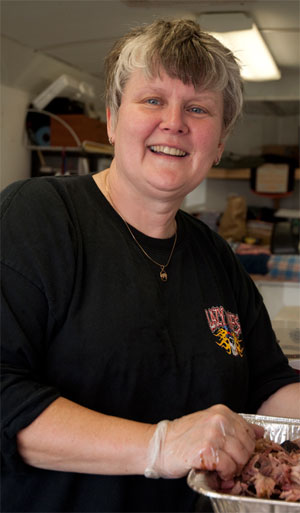 Competitive barbecue may be the fastest growing sport in the nation with more than 500 cookoffs across the country. Many of the cooks at each event are locals, but a growing number are, like Weaver, part of a band of roving gypsies who drive for days and get fired up to go for gold and glory. Some hit the highway every weekend from May through October.
Competitive barbecue may be the fastest growing sport in the nation with more than 500 cookoffs across the country. Many of the cooks at each event are locals, but a growing number are, like Weaver, part of a band of roving gypsies who drive for days and get fired up to go for gold and glory. Some hit the highway every weekend from May through October.
In July, that baseball field in tiny Shannon, IL, population 900, becomes the "Barbecue Field of Dreams" because Shannon is the home of the Illinois State BBQ Championship (ISBC) and the destination for a fleet of RVs and trailers loaded with meat and steel and some of the best barbecue cooks in the world. These are the real Iron Chefs towing torpedo shaped smokers the size of sportscars on their way to a throwdown Bobby Flay wants no part of.
The 19 year old event is sanctioned by the Kansas City Barbeque Society (KCBS), supervisor of more than 200 events from Canada to Mexico. This year, on July 10-11 2009, the ISBC drew 55 teams to compete in the standard four KCBS categories: Barbecue chicken, ribs, pork butt, and beef brisket. In addition, for the past 11 years, Shannon has an invitation only pork shootout called Butt to Butt that is held a day before the main event.
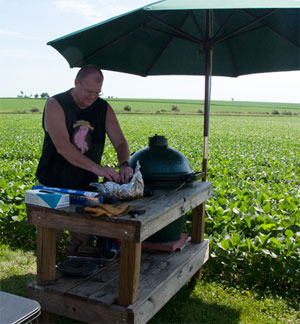 Competitors paid the $200 entry fee and drove in from Texas, Kansas, Minnesota, Wisconsin, Tennessee, Missouri, Arkansas, Iowa, Kentucky, and all over Illinois. Some are caterers or restaurateurs looking for publicity and trophies that will give their businesses a boost, and more than a few are hobbyists and barbecue addicts. A handful travel the circuit practically full time, staying in campgrounds and motels and occasionally vending their award winning wares at state fairs and corporate picnics.
Competitors paid the $200 entry fee and drove in from Texas, Kansas, Minnesota, Wisconsin, Tennessee, Missouri, Arkansas, Iowa, Kentucky, and all over Illinois. Some are caterers or restaurateurs looking for publicity and trophies that will give their businesses a boost, and more than a few are hobbyists and barbecue addicts. A handful travel the circuit practically full time, staying in campgrounds and motels and occasionally vending their award winning wares at state fairs and corporate picnics.
Prize money can be significant. The biggest check goes to the Grand Champion, the team with the highest score in all four standard categories. It is $2,000 at the ISBC and it can swell to $10,000 at some other events depending on the number of teams and sponsors. ISBC pays $1,500 to the second place finisher, the Reserve Grand Champion, $500 to each category winner, with smaller checks to second through fifth place finishers.
It can add up. In 2006, a trucking company maintenance manager and his wife from Marietta, OK, Mike and Debbie Davis, known as the Lotta Bull BBQ team, set a record for winnings when they took an unprecedented 11 Grand Championships, including the biggest of them all, the The American Royal Open in Kansas City, MO, topping more than 200 teams. They probably grossed about $200,000 that year. Then there's the profits from their barbecue sauces, spice blends, DVDs, tuition from their cooking seminars, and endorsements. Even after deducting about $50,000 expenses, that's more than a lot of restaurant owners make in a year.
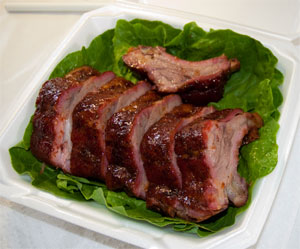 But money is not all that brings them to this baseball field near the Wisconsin border. Among the draws is the fact that the winner qualifies to compete in The Jack Daniel's World Championship Invitational Barbecue, in Lynchburg, TN. The Jack is considered to be the Superbowl of barbecue because it is open only to teams that win state championships and other selected tough competitions, because it is held at the end of the barbecue season in late October, and because the distillery throws one heckuva party for the teams. But Weaver especially likes the fact that Shannon is "all about the food and the cooks." Unlike other events which have become big festivals, there are no rock bands, rides, vendors, arts and crafts shows, or any distractions. "The management is wonderful, and it is so well organized. It's beautiful here, peaceful and quiet. It's all about the food."
But money is not all that brings them to this baseball field near the Wisconsin border. Among the draws is the fact that the winner qualifies to compete in The Jack Daniel's World Championship Invitational Barbecue, in Lynchburg, TN. The Jack is considered to be the Superbowl of barbecue because it is open only to teams that win state championships and other selected tough competitions, because it is held at the end of the barbecue season in late October, and because the distillery throws one heckuva party for the teams. But Weaver especially likes the fact that Shannon is "all about the food and the cooks." Unlike other events which have become big festivals, there are no rock bands, rides, vendors, arts and crafts shows, or any distractions. "The management is wonderful, and it is so well organized. It's beautiful here, peaceful and quiet. It's all about the food."
Click here for more about barbecue competitions, who runs them, the colorful people involved, and links to some of the best.
Candy Sue Weaver, a BBQr's Delight
A wrinkle-free 56 years old, Weaver has pale blue eyes that glow when she smiles, a gentle Southern drawl, and the ability to make everyone her friend. She has been on the circuit since 2004 and enters about 15 events per year. Based out of Pine Bluff, AR, about an hour south of Little Rock, she has had some success, winning Butt to Butt a few years ago and her first Grand Championship in a major event in 2009 in Lula, MS, at the Isle of Capri Casino, beating 43 other teams. It was an especially poignant moment since her 82 year old father, who rarely comes to competitions, was there to see her victory. She dreams of being selected to compete in The Jack now that she has qualified but space is limited, and not all qualifiers make the random selection in a drawing of names of the top winners.
"I love competing and I especially love the people I've gotten to know on the circuit. Many have become best friends." Many of the men on the circuit are former high school jocks channeling their testosterone into something better suited to their age. Weaver is a rare female team captain. "I don't know where I got the gumption," says Weaver. "I played piccolo in the band in high school."
It is rigorous work. Weaver usually hits the road on Thursday and doesn't get to shower or sleep in her own bed again til Sunday or Monday. Because this event has the extra Butt to Butt cookoff, and, as a former winner, she was among the few invited to compete, so this roadtrip is a day longer. She had to knock off work on Tuesday and hit the Interstates on Wednesday. During the competition, even the cooks with automated thermostat controlled auger fed cooking systems rarely sleep more than an hour or two uninterrupted as they check their meat, adjust the temps of their smokers, and pace from nerves. It is also dangerous work. There are hot coals, sharp knives, and lightening. Weaver has just finished the fourth surgery on a hand smashed between her truck's trailer ball and her trailer's hitch. She will never play piccolo again.
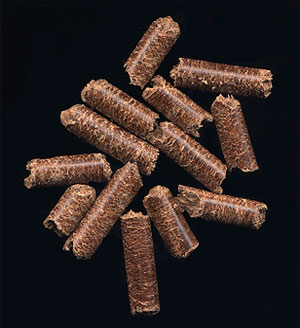 BBQr's Delight is really not much of a team. It is pretty much Weaver and, if she is lucky, a friend will ride with her or meet her at the site and work as gofer. This is pretty standard. Most teams are the cook and his wife or a friend. The team is named after Weaver's business, a division of Fiber Resources, a good sized wood products company in Pine Bluff started by her father and brother. She joined them after a career in information technology and a divorce, when her mother died in 1999. Their main product is wood pellets that fuel home heating systems. There are tens of thousands of rural homes that are heated by burning wood pellets made by compressing sawdust into tubes about the thickness of a pencil and about two erasers long. They look like rabbit food. Because they are pure wood, with no additives or binders, they burn hot and clean, and because they are made from sawdust from lumber mills, they are cheap and, unlike logs, they are critter and mold free.
BBQr's Delight is really not much of a team. It is pretty much Weaver and, if she is lucky, a friend will ride with her or meet her at the site and work as gofer. This is pretty standard. Most teams are the cook and his wife or a friend. The team is named after Weaver's business, a division of Fiber Resources, a good sized wood products company in Pine Bluff started by her father and brother. She joined them after a career in information technology and a divorce, when her mother died in 1999. Their main product is wood pellets that fuel home heating systems. There are tens of thousands of rural homes that are heated by burning wood pellets made by compressing sawdust into tubes about the thickness of a pencil and about two erasers long. They look like rabbit food. Because they are pure wood, with no additives or binders, they burn hot and clean, and because they are made from sawdust from lumber mills, they are cheap and, unlike logs, they are critter and mold free.
Since 1998 Weaver's division has made food grade pellets for barbecue from a wide range of woods, each with a different flavor including hickory, oak, maple, alder, apple, cherry, hazelnut, peach, and mesquite. A lot of home barbecuers use them on charcoal and gas grills instead of wood chips because they are guaranteed to be from the tree on the label and because you can measure how many you use and get precisely the amount of smoke flavor you want.
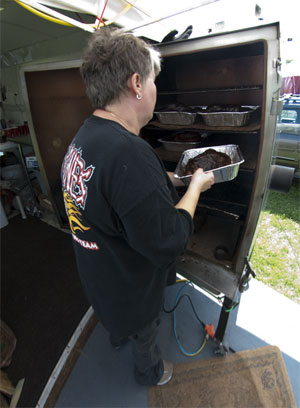 There are even a number of grills and smokers that use pellets for fuel instead of charcoal and gas. Pellets are an excellent source of energy and smoke, and because you can precisely control the amount of fuel you can easily control the temp. No hot coals, no flareups. Weaver sells more than $1 million BBQr's Delight pellets a year, and brings huge bags with her to competitions to deliver to her many customers who hate paying the shipping fee.
There are even a number of grills and smokers that use pellets for fuel instead of charcoal and gas. Pellets are an excellent source of energy and smoke, and because you can precisely control the amount of fuel you can easily control the temp. No hot coals, no flareups. Weaver sells more than $1 million BBQr's Delight pellets a year, and brings huge bags with her to competitions to deliver to her many customers who hate paying the shipping fee.
For this event she also brought two smokers, Fast Eddy's by Cookshack, called FEC 100s, state of the art pellet burners. During the cookoff these $3,600 machines sit outside her trailer under a canopy. If not for the fact that they are belching smoke you might think them to be stainless steel refrigerators. The rest of the teams use charcoal. Almost nobody burns logs anymore. The flavor is too strong, the heat is too hard to control. Gas or electric cookers are not allowed in KCBS events because they are too easy and too far from traditional barbecue methods. In the past few years, more and more teams are using pellet burners, especially FECs, because they are pretty close to set-it-and-forget-it easy and they are winning. Click here for more info about pellet cookers.
Thursday: Preparing to go Butt to Butt
In all other categories prize money is divided between the top five winners, but in Butt to Butt it's winner take all, $1,000. After the officials inspect her meat to make sure it has not been seasoned or doctored in advance, after dark Thursday night, Weaver begins preparing her butts in the kitchen she has built in her trailer. She will cook four butts, each about eight pounds, and select the best meat from each. She begins by injecting each butt with a cup of her secret marinade, massaging it in, and allowing it to rest in a cooler for at least one hour so the salty solution can migrate through the different muscles.
About 10 p.m. she takes her butts out of the chill chest, strips off their cryovac bags, and prepares them for the smoker. She trims off excess fat and butterflies the hunk of pig in an unusual fashion that leaves one muscle, the one she calls the "money muscle", standing upright. Click here to see how she butchers her butts and for more tips on preparing pulled pork at home from Boston butts.
Weaver then adds her rub, a variety of spices traditional to Southern barbecue, creating a coating on all sides. There's salt, garlic powder, black pepper, and an unlabeled bottle with a blend of other spices. I ask what's in it and she just smiles. Click here for a good spice rub recipe. Not hers, but it will do.
She is meticulous about sanitation, wearing gloves, using a disposable cutting board, wiping everything with Chlorox wipes, and keeping everything that is perishable well chilled. Click here for more on barbecue food, fire, and knife safety.
The meat goes into her smoker at 240F about midnight, right in the middle of a bodacious thunderstorm complete with horizontal rain driven by 30 mile winds. Two years ago lightening hit the chain link fence just a few feet from her trailer showering sparks in a spectacular and frightening fireworks display. Cooks run from site to site helping each other take down their canopies and tents and tie down anything loose. Then they get back to their meat.
Friday: Judgment Day
When the meat gets to be the color she likes, a deep ruddy mahogany, Weaver wraps it in aluminum foil, tosses in a few ounces of flavorful liquid whose ingredients are also secret, and puts it back in the cooker. The technique is called the Texas Crutch. This creates a small amount of steam and helps tenderize the meat. But she walks a tightrope. Too much steam and the meat gets mushy, and that's a ticket to the bottom of the rankings.
By dawn the last of the storm waves has passed and the cooks inspect their rigs, repair damage, up their tents, and whup up the hearty breakfasts necessary fuel these perpetually hungry often oversized carnivores.
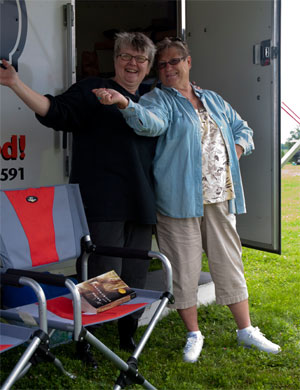 Clear skies can be seen over Iowa moving our way. One minute we are looking for the storm shelter, and the next minute we are looking for the SPF 40. Weaver checks her meat temps and she is pleased with their progress. With her iPod blaring Labelle's 1975 smash "Voulez-vous coucher avec moi?" and other Motown hits, Weaver and her friend Tana Shupe break into a nervous dance.
Clear skies can be seen over Iowa moving our way. One minute we are looking for the storm shelter, and the next minute we are looking for the SPF 40. Weaver checks her meat temps and she is pleased with their progress. With her iPod blaring Labelle's 1975 smash "Voulez-vous coucher avec moi?" and other Motown hits, Weaver and her friend Tana Shupe break into a nervous dance.
Shupe is the recently retired director of The Jack and a member of the KCBS Board of Directors. She drove 6 hours from Tullahoma, TN, with two of the judges, David Roper and Linda Gould, to meet Weaver in Memphis, and they all rode together to Shannon the rest of the way. Shupe is there to help Weaver if asked, but Weaver is on autopilot and needs little help. She has her routine down responding to the alarm clock all day long.
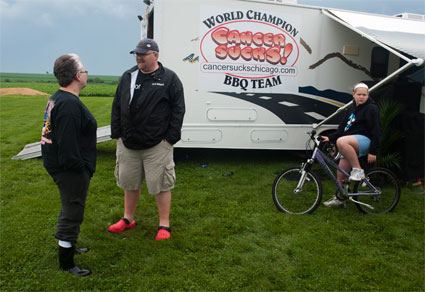 With several hours to go before the judging, Weaver has time to catch up with her friends. On the competition circuit, many of the cooks see each other every week or two and deep bonds are formed. Anong them is Scott Johnson of the CancerSucksChicago.com team and one of his two daughters, Zoe, age 11.
With several hours to go before the judging, Weaver has time to catch up with her friends. On the competition circuit, many of the cooks see each other every week or two and deep bonds are formed. Anong them is Scott Johnson of the CancerSucksChicago.com team and one of his two daughters, Zoe, age 11.
Johnson's wife, Corliss, died of cancer in 2003 and in 2005 Scott, Zoe, his younger daughter Lexi, and his sister Liz, hit the BBQ road raising awareness and money for cancer research. They have not just acquitted themselves well, they have moved into the upper echelon of the teams, culminating with the Grand Championship at The Jack in 2006. Zoe helps by preparing the final boxes for turn-in. Appearance in 1/3 of the score, so this is not a trivial matter. You can follow CancerSucksChicago.com on their blog.
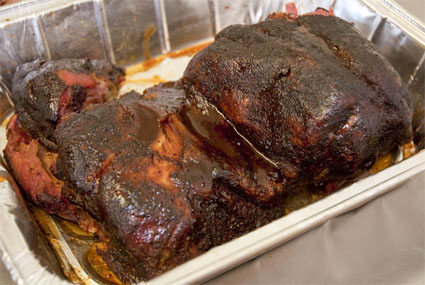 Mid-morning, after cooking her butts about eight hours, Weaver removes them from the 240F cooker and puts them in another cooker at about 140F to hold. Turn-in time is 5 p.m. At 3:15 Weaver is ready to sauce her butts. She opens the foil packages and drains the whiskey colored liquid. She sets a bit aside to mix back into the sauce for touching up the final presentation meat. One could build a small aircraft with all the aluminum foil used at one of these events.
Mid-morning, after cooking her butts about eight hours, Weaver removes them from the 240F cooker and puts them in another cooker at about 140F to hold. Turn-in time is 5 p.m. At 3:15 Weaver is ready to sauce her butts. She opens the foil packages and drains the whiskey colored liquid. She sets a bit aside to mix back into the sauce for touching up the final presentation meat. One could build a small aircraft with all the aluminum foil used at one of these events.
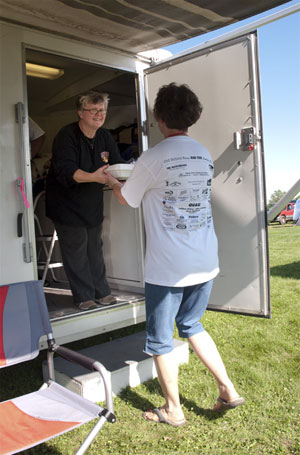 The mahogany colored meat has undergone profound changes. Now about 25% lighter than when it went into the cooker, the spices in the rub have roasted and fused with the surface, forming a crisp crust affectionately called bark. Beneath the surface, smoke and combustion gasses have penetrated and turned abut 1/8" bright pink, the telltale "smoke ring" that the uninitiated often mistake for undercooked meat when it is really a badge of expertise.
The mahogany colored meat has undergone profound changes. Now about 25% lighter than when it went into the cooker, the spices in the rub have roasted and fused with the surface, forming a crisp crust affectionately called bark. Beneath the surface, smoke and combustion gasses have penetrated and turned abut 1/8" bright pink, the telltale "smoke ring" that the uninitiated often mistake for undercooked meat when it is really a badge of expertise.
Much of the fat has melted and rendered off, but much of it has circulated around the muscle fibers wetting and lubricating them. The sheath of collagen that surrounds each fiber and connects it to bones and other fibers also melts adding richness and moist tenderness.
Weaver offers me a taste. It is perfect. It is mellow, slippery between tongue and roof, almost buttery, and slightly salty and tangy from the rub and injections, with a hint of heat in the finish. But Weaver is not done.
About an hour before turn-in, she invites Shupe and me to taste three sauce blends she has made by doctoring her favorite commercial product, Smoky Mountain Smokers Barbecue Sauce. She dips shards of pork into each, and we close our eyes and taste. The sauce is tomato based, thick rich, complex, sweet with molasses, with a slight hot pepper bite in the end. But I cannot concentrate on the sauce, the meat is so entrancing. It is impossible for me to say one blend is better than another. Shupe voices a well-educated preference and Weaver agrees. She paints the meat liberally and thoroughly with their choice. The sauce coated meat then goes back into the cooker for a short while to bake in the glaze. One coat is all it needs. Click here for more about classic American barbecue sauce types.
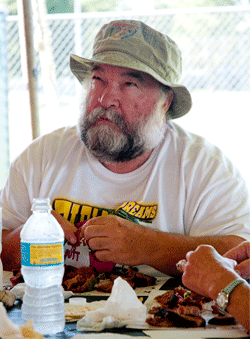 About 45 minutes before turn-in, Weaver removes the sauced meat. She then prepares her presentation. With a twist of her fingers, the bone slides out like it is coated in buttah. The money muscle is sliced and the others are pulled into shreds about 3" long. They get a splash of sauce mixed with the juices that the meat gave up so graciously.
About 45 minutes before turn-in, Weaver removes the sauced meat. She then prepares her presentation. With a twist of her fingers, the bone slides out like it is coated in buttah. The money muscle is sliced and the others are pulled into shreds about 3" long. They get a splash of sauce mixed with the juices that the meat gave up so graciously.
Each team must deliver their meat in a 9" x 9" styrofoam box. Weaver has a particularly artful presentation, among the best I have seen, but she will not let me show it here lest her competitors imitate it. Her box shows the glowing dark bark of the money muscle glazed with sauce, but the meat underneath is relatively unadorned. A bite brings crunch from the crust of spices, sweetness of the sauce, but in the end, the flavor is pork. On the other hand, the pulled pork is saucy, literally and figuratively. Many cooks turn in a box piled with pulled pork drenched in sauce. Weaver's box is like a Bento box.
In a normal competition there must be at least 6 samples, one for each judge, but there are 10 judges for Butt to Butt, so she must rally pack it in. The rules allow lettuce, parsley, and a few other garnishes. Parsley is the rage nowadays, so ever the contrarian, Weaver opts for Romaine today. The lid is closed and Weaver hands her baby to a competition official who will deliver it to the judging tent where it will be assigned a new number so nobody can know which sample is from which team.
The hot samples are whisked through the check-in and the boxes are opened and lined up on a table for the judges, many of whom are also competitive cooks. The 10 Butt to Butt judges are more experienced than the 60 ISBC judges due in on Saturday. They troop the line and ogle the entries.
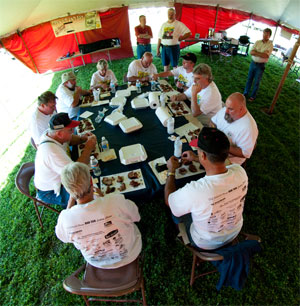 Then they sit, pass the boxes around, take out samples, and set them on a placemat divided by grid lines. They taste in silence and rate the meat for appearance, taste, and tenderness, up to 9 points for each. A perfect score is 27. Three judges give Weaver's their highest scores, but two complain that there are pockets of seasoning in their large chunks and they give it low scores. Apparently Weaver's marinade was not properly dispersed through the money muscle.
Then they sit, pass the boxes around, take out samples, and set them on a placemat divided by grid lines. They taste in silence and rate the meat for appearance, taste, and tenderness, up to 9 points for each. A perfect score is 27. Three judges give Weaver's their highest scores, but two complain that there are pockets of seasoning in their large chunks and they give it low scores. Apparently Weaver's marinade was not properly dispersed through the money muscle.
By 8 p.m. all the other teams have rolled in for the Saturday's scrum and set up camp. RVs, colorfully painted trailers, catering trucks, canopies, pup tents, LaFuma lounge chairs, card tables, kids, dogs, boom boxes, and frisbees make the outfield of the baseball diamond come alive. The teams gather in the big tent to hear Mike Lake explain the rules for ISBC and to announce the results of Butt to Butt.
Weaver professes fatalism and says "If it can't be me, I want it to be one of my customers" but her demeanor all day has said clearly that she's in it to win it. I have not told her what I heard in the judging tent.
The competitors line up for the announcement. Lake announces fifth, fourth, third, and second, leaving first and sixth standing. Weaver is fourth.
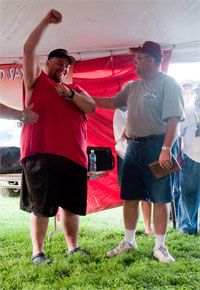 The winner is Todd Johns of Pork Pullin Plowboys, an IT project manager from Blue Springs, MO. And he is one of Weaver's customers.
The winner is Todd Johns of Pork Pullin Plowboys, an IT project manager from Blue Springs, MO. And he is one of Weaver's customers.
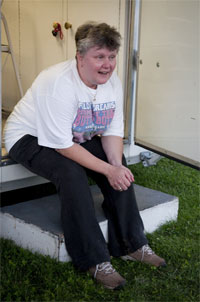 An exhausted Weaver is philosophical. "I did the best I could with what I had." Blaming the pig? "Absolutely not." I ask if she ever thinks about quitting. "Yeah, but every time I get close to burning out I win something."
An exhausted Weaver is philosophical. "I did the best I could with what I had." Blaming the pig? "Absolutely not." I ask if she ever thinks about quitting. "Yeah, but every time I get close to burning out I win something."
She professes to be happy for Johns and plans to buy an ad in the KCBS newspaper, the Bull Sheet, with Johns' photo, congratulating him and bragging that he uses BBQr's Delight. Competition is not just an avocation for Weaver, it is good for business. "You can't put a dollar value on his win" she says.
Weaver looks whipped after Friday's award ceremony, but she has no time to waste. She has to prepare for Saturday when she must cook pork butt again as well as chicken, ribs, and brisket. The pork butts will go into the smoker around midnight as will the brisket.
If tradition holds, Johns will not do well in Saturday's judgings. The Butt to Butt winner rarely does. He fingers the check, calls his wife with the news, and muses "I'm thinking of going home now." Good thing he doesn't.
After dark old friends visit into the wee hours as they tend their fires and generators. Beer, whiskey, dinner, cigars, and lies are shared.
Saturday: Cranking up for The Illinois State Barbecue Championship
Many of the teams join in the ritual toast. Skip it at the risk of bad luck. Weaver skips it in order to take care of her pork butts and briskets. Darren Warth of Iowa's Smokey D's BBQ, in red, will be glad he did not miss it.
I wander the grounds to visit the cooks and check out their rigs. The storms are gone and Saturday turns sunny, cloudless, in the 80s, and a gentle humid breeze spreads the sweet smell of fruit wood smoke, caramelizing meat, and roasting spices across the outfield.
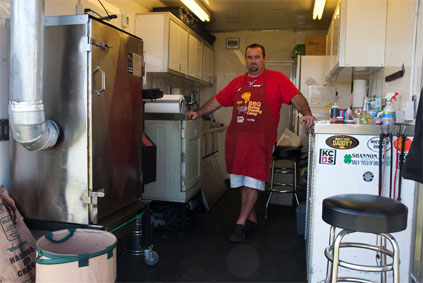 Warth's motor home has a pretty complete competition kitchen with an FEC 100, sink, refrigerator, cabinets, and air conditioned sleeping quarters up front. Warth, from Des Moines, IA, has a restaurant and catering service, so his team bear's its name, Iowa's Smokey D's BBQ. He and his wife even bring a little dustmop of a dog along named Swiffer. "You've gotta get outta the elements and be comfortable to concentrate if you hope to win," he explains. "Especially if you're gonna do it every weekend." And he does do it almost every weeked during warm weather, entering 20-22 events a year. "It's addictive. It's our cocaine."
Warth's motor home has a pretty complete competition kitchen with an FEC 100, sink, refrigerator, cabinets, and air conditioned sleeping quarters up front. Warth, from Des Moines, IA, has a restaurant and catering service, so his team bear's its name, Iowa's Smokey D's BBQ. He and his wife even bring a little dustmop of a dog along named Swiffer. "You've gotta get outta the elements and be comfortable to concentrate if you hope to win," he explains. "Especially if you're gonna do it every weekend." And he does do it almost every weeked during warm weather, entering 20-22 events a year. "It's addictive. It's our cocaine."
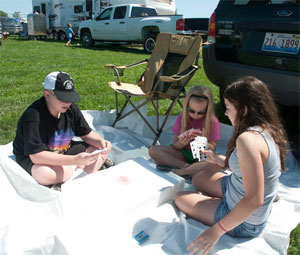 Many of the cooks like to think that what they do is a traditional form of cooking and see themselves as purists keeping the flame of classic low and slow Southern barbecue alive in America. It is a cooking style that evolved from pre-Columbian Caribbean natives who slow smoked fish and iguanas on a wooden rack called a barbecoa. It was taken to the next level by Southern slaves who smoked cheap cuts of tough meat on racks over pits dug in the ground. Before long concrete and brick pits grew above ground and the barbecue restaurant was invented.
Many of the cooks like to think that what they do is a traditional form of cooking and see themselves as purists keeping the flame of classic low and slow Southern barbecue alive in America. It is a cooking style that evolved from pre-Columbian Caribbean natives who slow smoked fish and iguanas on a wooden rack called a barbecoa. It was taken to the next level by Southern slaves who smoked cheap cuts of tough meat on racks over pits dug in the ground. Before long concrete and brick pits grew above ground and the barbecue restaurant was invented.
In the mid 20th century barbecue became portable when Texas oil workers made large tubular "pits" on wheels by cutting oil barrels, pipes, and propane tanks in half and welding them to boat trailers. Mix pickup trucks with trailers, fire, steel, meat, and testosterone, and you can begin to understand the popularity of the modern barbecue competition.
As barbecue selling moved out from under shade trees and into restaurants, the smokers got high tech, with gas burners and thermostats. In Shannon one high tech team even has a T-shirt bragging that they are keeping the flame of traditional barbecue alive. It's pretty hard to call an FEC 100 or an Ole Hickory Pit or a Southern Pride Smoker traditional. Something else has changed. Although this is supposed to be an outdoor sport, with the advent the trailers and RVs, there is plenty of pale skin on display, and although this is a competition, there are not many athletic body types.
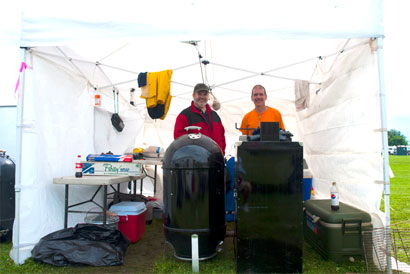 Not everyone has a fancy schmancy smoker. Mike Flach of Weekend Smokers in St. Louis, MO, won last year's Butt to Butt. This year he teamed with his friend Merrill Powers of Elmhurst, IL, and cooked with a $400 Weber Smokey Mountain and a slightly more expensive Backwoods Smoker, both low tech but highly regarded charcoal smokers. During the storm Thursday night Powers posted this to an email list: "Mr. Flach and I are sitting in a corn field with pouring rain and lightning crashing around us. The water is building and we will soon be cooking in a mud hole. This competition thing sounds like a lot of fun." I asked Flach if it was worth the time, gas money, charcoal, meat, entry fee, and other costs. "I often wonder why I gave up golf and fishing for this" he reples. "Then I get an 89 cent Walmart ribbon and, YA HA! 4th Place! Where's the next competition?"
Not everyone has a fancy schmancy smoker. Mike Flach of Weekend Smokers in St. Louis, MO, won last year's Butt to Butt. This year he teamed with his friend Merrill Powers of Elmhurst, IL, and cooked with a $400 Weber Smokey Mountain and a slightly more expensive Backwoods Smoker, both low tech but highly regarded charcoal smokers. During the storm Thursday night Powers posted this to an email list: "Mr. Flach and I are sitting in a corn field with pouring rain and lightning crashing around us. The water is building and we will soon be cooking in a mud hole. This competition thing sounds like a lot of fun." I asked Flach if it was worth the time, gas money, charcoal, meat, entry fee, and other costs. "I often wonder why I gave up golf and fishing for this" he reples. "Then I get an 89 cent Walmart ribbon and, YA HA! 4th Place! Where's the next competition?"
As the morning progresses, Weaver is still in her trailer preparing her chicken. She marinates thighs for about an hour. Nobody does breasts anymore. They're too easy to overcook and dry out. Chicken is the first category to be judged and turn-in is at noon. Then come ribs 30 minutes later, pork butt, and beef brisket, each in rapid fire, separated by only 30 minutes. She is moving quickly, methodically, and smoothly, with steps well practiced and synched to her nagging alarm clock.
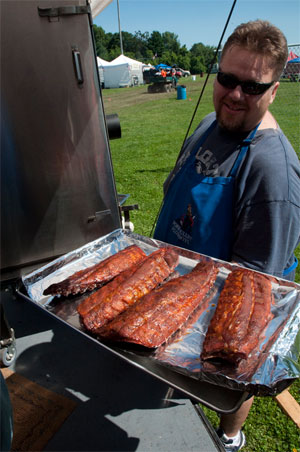 Noon arrives and Weaver's chicken goes to the judges. She is pleased with her effort. It has been her best category lately. But there is no time to pat her own back. Ribs are due in 30 minutes, and if you are a minute late you are disqualified.
Noon arrives and Weaver's chicken goes to the judges. She is pleased with her effort. It has been her best category lately. But there is no time to pat her own back. Ribs are due in 30 minutes, and if you are a minute late you are disqualified.
For the first time in years, Weaver chooses to submit baby back ribs. Usually she, like many other cooks, prefer to use spare ribs cut into what are called St. Louis Cut (SLC) style ribs. They are meatier, fattier, and richer. For the heck of it she cooked some SLC, and later, after her baby backs are sent to the tent, she compares the two and moans "I turned in the wrong ribs."
Just before turn-in, Johns wanders over to Weaver's trailer shows off his ribs. She is impressed. As he walks back to his trailer she shouts "Good luck!" and under her breath wistfully mutters "Not that you'll need it." Pictures of her ribs and brisket presentations are above, but she will not let me show you how she plates her chicken and pork.
Mike and Theresa Lake and their friend Caroline Smith run this competition, and they have managed to round up 60 volunteer judges, 90% of whom have taken a class in judging and have the Certified Barbecue Judge (CBJ) title. They sit at tables in the big tent on the grounds and nibble on six entries for each category. In three hours they will take at least 30 bites of meat if they take only one bite of each sample. Most take 2-3 bites, and some cannot resist stripping a rib bare.
Alas, the weakness of the system is that there is no taste-off between the top scoring entries, so if one table has a couple of stingy judges who got up on the wrong side of the bed, or too many rookie judges, a contender is easily eliminated. In cheese and wine competitions there are usually tasteoffs where the top scoring entries go head-to-head, a much fairer system. But ribs get cold and dry in a hurry so nobody has devised an effective tasteoff system yet. Still, some teams seem to always be near the top.

And the winners are
Weaver is called for fourth place in chicken and as she strides to the podium to get her ribbon she shouts "Gas money!" The crowd cracks up. She finishes 13th overall out of 55 teams, 36th in ribs, 8th in pork, and 19th in brisket.
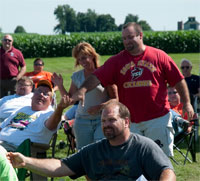 Darren and Sherry Warth of Iowa's Smokey D's BBQ win Grand Champion finishing third in chicken, 25th in ribs, first in pork, and second in brisket. That puts their winnings at $3,100. Good thing they went to the Saturday morning toast. They burn BBQr's Delight pellets in an FEC 100, so Weaver can celebrate her customers' victories in both Butt to Butt and ISBC.
Darren and Sherry Warth of Iowa's Smokey D's BBQ win Grand Champion finishing third in chicken, 25th in ribs, first in pork, and second in brisket. That puts their winnings at $3,100. Good thing they went to the Saturday morning toast. They burn BBQr's Delight pellets in an FEC 100, so Weaver can celebrate her customers' victories in both Butt to Butt and ISBC.
Reserve Grand Champion was Ron Lewen of Captain Ron's Brew-n-Que from Batavia, IL. Scott Johnson's Cancersuckschicago.com finished third overall. Todd Johns' Pork Pullin Plowboys came in fifth so he's glad he didn't fold after winning Butt to Butt. Randy Twyford, the toastmaster, came in sixth, and Mike Flach's Weekend Smokers, last years Butt to Butt winner, is 35th. Click here for a complete list of all finishers.
When cleanup is mostly done, at about 6 p.m., the Lakes invite the teams to their home a few blocks away for pizza, drinks, neighbor made pies, and tale swapping. The cooks are clearly relaxed and enjoying the decidedly non-corporate management team's hospitality, but Weaver, in the blue T-shirt second from right below, is restless to hit the road. "Ahm tahrd" she sighs. She has a room reserved 170 miles away and she is looking forward to truckin' to The Beach Boys, Smiley Smile, Bon Jovi, and Poco. And to leaving a ring in the hot tub.
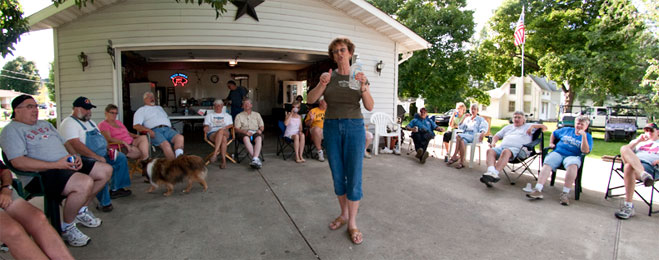
Before she can go, there is another tradition to be honored, Theresa Lake offers a toast and everyone passes and drinks from the same bottle, unafraid of swine flu or anything porcine.
Unless otherwise noted, all text and photos are Copyright (c) 2009 By Craig "Meathead" Goldwyn, AmazingRibs.com, and all rights are reserved. Click here for information on reprint rights.